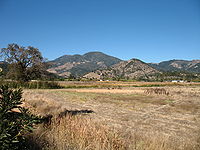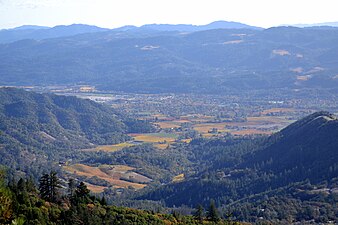Mount Saint Helena
| Mount Saint Helena | |
|---|---|
 Mount Saint Helena, viewed from northern Napa Valley | |
| Highest point | |
| Elevation | 4,342 ft (1,323 m) NAVD 88[1] |
| Prominence | 1,823 ft (556 m)[2] |
| Listing | California county high points 44th |
| Coordinates | 38°40′10″N 122°38′01″W / 38.669340858°N 122.633487528°W[1] |
| Geography | |
| Parent range | Mayacamas Mountains |
| Topo map | USGS Mount Saint Helena |
| Climbing | |
| Easiest route | Hiking trail[3] |
Mount Saint Helena (Wappo: Kanamota, "Human Mountain")[4] is a peak in the Mayacamas Mountains with flanks in Napa, Sonoma, and Lake counties of California. Composed of uplifted volcanic rocks from the Clear Lake Volcanic Field, it is one of the few mountains in the San Francisco Bay Area to receive any snowfall during the winter.
The mountain has five peaks, arranged in a rough "M" shape. Its highest point, North Peak, is in Sonoma County. The second-tallest, immediately east of the main summit, is the highest point in Napa County.[5] The headwaters of the Napa River arise on the southeast slope of Mount Saint Helena.[6][7]
History

Mount Saint Helena has had an explosive history of pyroclastic flows that resulted in California's Petrified Forest.
Mount Saint Helena, originally named Kanamota ("Human Mountain") by the Wappo, and later Mount Mayacamas by Spanish colonists, was renamed by a Russian survey party who ascended the peak in 1841. They left a copper plate on the summit inscribed with the date of their visit and the name of Princess Helena de Gagarin, wife of Alexander G. Rotchev, the commanding officer of Fort Ross.[8][9]
The peak is accessible by hiking trails leading from Robert Louis Stevenson State Park.[3] The trails are approximately 6 miles (9.7 km) long.
Scottish writer Robert Louis Stevenson and his wife Fanny Vandegrift Osbourne spent the summer of 1880 honeymooning in an abandoned mining camp on Mount Saint Helena. Stevenson's book The Silverado Squatters describes his experiences while living there.[3] A state park was named after him near here.
Representation in other media
The mount is described by Ambrose Bierce in his ghost story The Death of Halpin Frayser. Ursula K. Le Guin's novel Always Coming Home is about a post-apocalyptic society that considers Mount Saint Helena sacred.
-
Mount Saint Helena
-
Another view of the mountain
-
Robert Louis Stevenson monument in Robert Louis Stevenson State Park
Views from the summit
-
Calistoga viewed from Mount Saint Helena
-
Northern Napa Valley viewed from Mount Saint Helena
-
A view from the mountain
-
Another view
-
Another view
-
View after 2017 fire
-
Snow view
See also
References
- ^ a b "Mount Helena". NGS Data Sheet. National Geodetic Survey, National Oceanic and Atmospheric Administration, United States Department of Commerce. Retrieved 2009-08-14.
- ^ "Mount Saint Helena, California". Peakbagger.com. Retrieved 2009-08-14.
- ^ a b c "Mount St. Helena, Robert Louis Stevenson State Park". Greenbelt Alliance. Archived from the original on 2010-07-05. Retrieved 2009-08-14.
- ^ "Wappo Language". Wappo Indians of Napa County. Archived from the original on 2012-02-08. Retrieved 2012-08-15.
- ^ "Mount Saint Helena-East Peak, California". Peakbagger.com. Retrieved 2009-12-24.
- ^ "Napa River". Geographic Names Information System. United States Geological Survey, United States Department of the Interior. Retrieved 2009-08-14.
- ^ Kevin Courtney (March 28, 2010). "A search for Napa River's start runs through the heart of the valley". Napa Valley Register. Napa Valley Publishing.
- ^ "Humboldt County, CA History". California Genealogy and History Archives. Retrieved 2009-08-14.
- ^ "Napa County History". California Genealogy and History Archives. Archived from the original on 2009-03-27. Retrieved 2009-08-14.
External links
 Media related to Mount Saint Helena at Wikimedia Commons
Media related to Mount Saint Helena at Wikimedia Commons- "Mount Saint Helena". SummitPost.org.













